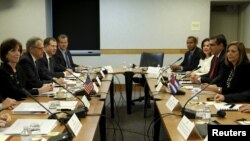The United States and Cuba began a fourth round of talks on Thursday aimed at overcoming obstacles to opening embassies in each other's capitals and re-establishing diplomatic ties, the crucial next step in their historic detente.
The meetings at the State Department are being led by U.S. Assistant Secretary of State Roberta Jacobson and Josefina Vidal, director of U.S. affairs at the Cuban Foreign Ministry.
There were no remarks as the talks began, although both sides have reported progress in closing in on a deal, part of an agreement clinched between U.S. President Barack Obama and Cuban President Raul Castro in December. Once diplomatic relations are restored, the long-time adversaries will work on the more complicated task of normalizing overall relations.
But Washington wants assurances that its diplomats will have more freedom of movement in Havana, while Castro this week reiterated Cuban concerns that dissidents are receiving "illegal" training at the U.S. Interests Section in Havana.
Jacobson assured lawmakers in testimony on Wednesday that Washington would not agree to the opening of an embassy in Havana without its diplomats being able to travel more freely outside the capital.
The two countries have interests sections rather than embassies in each other's capitals. Currently, U.S. diplomats cannot leave the capital without permission, while Cuban diplomats cannot travel outside of Washington and New York.
Jacobson, the lead U.S. negotiator with Cuba, said Washington also wanted assurances that Cubans would be able to visit the U.S. Embassy without being harassed by police and that there would be in an increase in U.S. embassy personnel.
She acknowledged, however, that the embassy would likely operate similar to those in other countries run by authoritarian governments where there are restrictive environments. China and Vietnam could serve as models for new rules governing U.S. diplomats movements in Cuba.
One of the most contentious issues between the former Cold War adversaries is Washington's so-called pro-democracy programs for Cuba, which Castro argues are "illegal" and in breach of international treaties on diplomatic missions.
The U.S. Interests Section in Havana offers Cubans free courses on journalism, English and information technology, and also allows Cubans to use the Internet.
The talks are the first since Obama announced on April 14 that he had decided to remove Cuba from the U.S. list of state sponsors of terrorism, which Havana had said was a necessary step for further progress.
The Cubans have signaled that any formal announcement on the re-opening of embassies would likely have to wait until after the 45-day Congressional review period for removing Cuba from the terrorism list. Cuba considers May 29 as the date when the review period ends.





